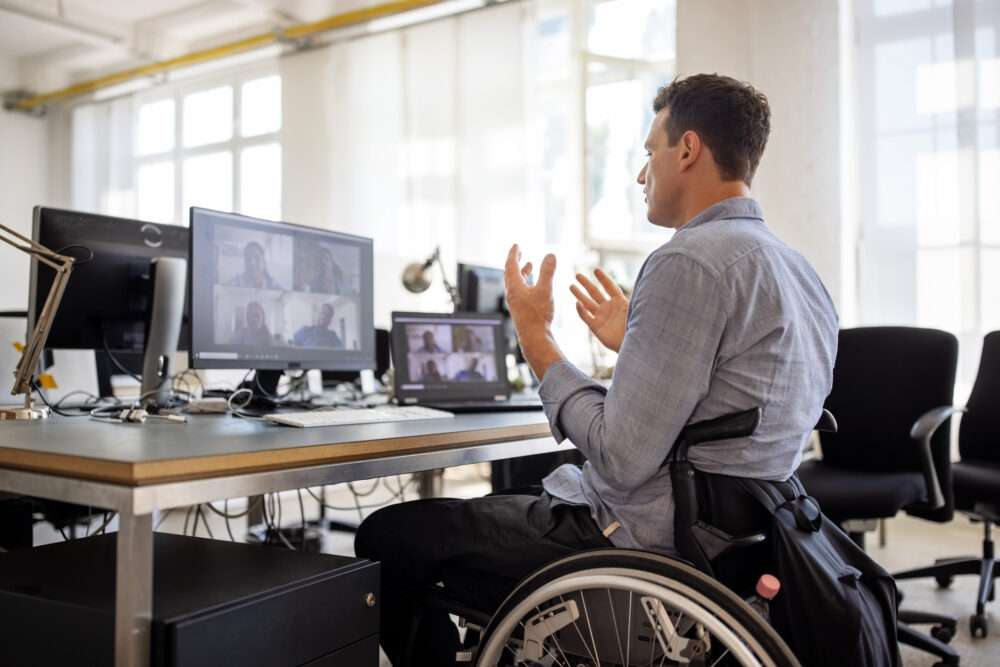People with disabilities in Iowa and elsewhere face special challenges that businesses and schools can help mitigate and respond to.
March is Developmental Disability Awareness Month, one of several annual events that highlight disability awareness. The other is World Day of Persons with Disabilities, organized by the United Nations and celebrated annually since 1992, to encourage business leaders to recognize the contributions of people with disabilities.
World Disability Day specifically recognises neurodiversity, “one of the most common invisible disabilities”, including people who may be diagnosed with ADHD, autism, dyslexia, Tourette’s syndrome and other natural variations in the brain that affect how they see the world and act in it.
Many of my students at Iowa State have these and other conditions, especially anxiety. A few years ago, I added neurodiversity to my syllabus, and the Center for Excellence in Learning and Teaching included it in their Mindful, Learner-Centered Syllabus Toolkit.
This statement says that I am aware of the symptoms mentioned above and am “committed to being proactive in helping you in this class.”
People with mental and physical disabilities have been bullied because of symptoms such as impaired social interaction, communication and concentration. They may also have problems following instructions, organizing their thoughts and other skills related to classroom learning.
People with disabilities have faced various challenges from ancient times to the present day.
In ancient Sparta, newborns with deformities or physical disabilities were examined by the elders, who decided whether the child should live or die. Conversely, in the 5th and 4th century BCE city-state of Athens, disabled people were allowed to work and given a small allowance, but relatives of mentally disabled people were told not to show them in public.
Because the Greeks believed in the unity of body and soul, any disability was thought to reflect a spiritual deficiency.
Even today, bullies target the psyche of people with disabilities, trying to take away their self-confidence. Such behavior can amount to harassment, which is defined as:
Unwanted conduct, including verbal abuse, name-calling, derogatory names and defamatory language; explicit or written statements; physical assault; or any other conduct that may be physically threatening, harmful or humiliating.
Many people with disabilities have been able to overcome such treatment.
One of Rome’s most famous emperors, Tiberius Claudius Nero Germanicus, was bullied throughout his childhood because he had a stutter and a tendency to walk with a limp. According to historians, “As a young man, his family humiliated and ostracized him, and his mother called him a ‘monster.'”
In that intolerant environment, Claudius came to the throne after his nephew Caligula, one of the most brutal tyrants in Roman history, was murdered by the Praetorian Guard.
The Roman senate and guards expected that Claudius, who was disabled, would become a puppet ruler, but he surprised everyone with his insight, discipline and strategic decision-making. He expanded the Roman Empire to Britain, Africa and the Middle East, enacted laws to protect slave laborers and give citizens more rights.
It is well known that people with disabilities can rise to the top of their fields of expertise.
The late Stephen Hawking, one of the world’s greatest scientists, battled amyotrophic lateral sclerosis (ALS) and spoke frequently about his struggle and how people with disabilities can overcome their challenges.
In an interview with The New York Times, Hawking said, “My advice to other disabled people is to focus on not letting your disability stop you, and not regret the things that stop you. Don’t let your disability stop you, not just physically, but mentally as well.”
According to the World Bank, 15% of the world’s population has some kind of disability. “People with disabilities are more likely to experience adverse socio-economic outcomes, including lower educational attainment, poorer health, lower employment levels and higher rates of poverty.”
Forbes magazine reports that people with disabilities are an untapped talent resource. The magazine dispels several myths about people with disabilities, such as their high rates of absenteeism and the challenges they face in terms of training, teamwork and productivity.
“Employers who doubt the capabilities of people with disabilities are out of touch with reality,” he said.
Accommodation is one of the keys to success.
Iowa universities offer accommodations for students with disabilities. Resources are available at the University of Iowa, Iowa State University and University of Northern Iowa.
Some teachers, despite having the resources, choose to ignore disabilities. In one such case, a physiology professor at Oxnard College reprimanded a hearing-impaired student for being unresponsive during an online class. The incident went viral on social media.
Such incidents occur in primary and secondary schools, as well as universities, and the study, titled “Bullying and Disability,” says that teachers who bully take advantage of power imbalances, “because victims have few recourse to authorities.”
The Americans with Disabilities Act prohibits harassment and discrimination.
In addition to knowledge of rights, self-advocacy is important – knowing how to speak up for yourself, where to get help, and who to ask if you have questions.
The Iowa Department of Education maintains a website with a variety of resources, including assistive technology, autism spectrum disorder, and education for the blind and deaf.
The Iowa Department of Human Rights has an Office of Disability Services that promotes employment for people with disabilities and provides information, referrals, evaluations and guidance, training, and advocacy services.
Iowa Compass provides additional information to Iowans with disabilities, their families and service providers.
If you are an individual with a disability and believe you have been discriminated against, you can contact the Iowa Civil Rights Commission. The ICRC helps individuals resolve complaints and maintains a website with detailed instructions for specific cases. You can also call the ICRC toll-free at 800-457-4416.
People with disabilities are our friends, colleagues and relatives. They deserve love, support and attention as they forge their own path to success.

